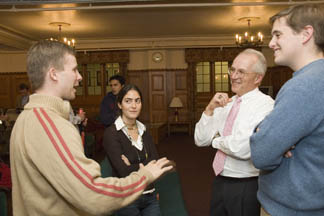Federal appeals court Judge Richard Wesley makes a convincing case for clerking after law school
By Linda Myers
The need to repay hefty student loans is one reason law school graduates are more apt to say yes to immediate job offers from well-heeled law firms. But in doing so they are missing an opportunity to gain invaluable experience clerking for a state or federal judge.

So says federal appeals court Judge Richard Wesley, J.D. '74. The 2005 jurist-in-residence at Cornell University Law School, Wesley was back on campus Oct. 23 through 27 convincing Cornell law students how rewarding the job of a law clerk can be.
Wesley was appointed in 2003 by President George W. Bush to the U.S. Court of Appeals for the Second Circuit, which serves New York, Connecticut and Vermont. His nomination was backed by such Democrats as U.S. Sen. Charles Schumer.
Wesley made a convincing argument for clerking when he met with law students Oct. 25 in Myron Taylor Hall's Saperstein Lounge. He also brought with him four credible witnesses -- his own clerks -- to bolster his case.
"Most of the major law firms will hold positions open if you decide to clerk for a year before joining one of them, and some will even pay you a substantial bonus for having clerked," he told the students.
"The knowledge you'll acquire working for a state or federal judge is immeasurable," he went on. "It will be your only opportunity to see the judicial process behind the veil, behind chambers. If you want to be a prosecutor or work in an appellate court, where better to learn?"
But getting a clerkship can be competitive, with only a handful of graduates selected from hundreds of qualified applicants. Wesley and his clerks explained what they look for in candidates. "Typically -- but not always -- they are in the top 10 percent of their classes and have law journal experience," said Wesley, then confessing he had not been in that percentage at Cornell Law School. "We also pay attention to extra experience, such as Moot Court, and people who have been active in outside organizations, such as Habitat for Humanity. Active people are usually good time managers, which is essential to clerking because the workload is heavy," he said.
Wesley and his clerks advised students to apply broadly to increase their odds of getting hired but also to shop for the judge whose values and working style seem to fit theirs best. Several of the clerks also suggested that law students look for opportunities where they will be most likely to work on actual cases.
One of the clerks, Zachary Gubler, talked about writing a case soon after being hired, then "getting grilled" by a prominent judge on some of the points. "I was flattered that a judge would take an idea I had seriously enough to come into my office and demolish it. I thought, wow. This is a pretty good job." The experience of clerking also "gives me a sense of the far-reaching impact of decisions I only minutely grasped in law school," he said.
Second-year law student Galit Avitan, who externed with a circuit court judge last summer and hopes eventually to be involved in appellate court work, said of the session with Wesley and his clerks, "I got a sense of excitement, humanizing the work product, the process."
Mor Wetzler, another second-year law student, who is considering clerking, then working in litigation after she graduates, said of the session, "It was valuable to have an insider's perspective." Wesley, she said, "set a standard. I'll be more selective in choosing the judges I apply to."
And Joseph Storch, a third-year law student who is considering seeking work in a university legal counsel's office after obtaining his J.D. degree, said, "It was an honor to hear from an accomplished judge who walked the same halls as we do."
Appearing on a panel, Wesley defended one of his appeals court decisions, Hamilton v. Beretta, in a discussion of whether gun manufacturers should be liable for crimes committed with guns. Wesley, who found gun manufacturers not to be liable in that case, said he believes that the heart of the problem of injuries and deaths from handguns is the illegal sale of guns in places where laws are lax and their transportation across state lines.
During his visit Wesley also taught a class in Professor Robert Hillman's course on contracts, met with the student editors of Law School journals and had a luncheon discussion with faculty.
Media Contact
Get Cornell news delivered right to your inbox.
Subscribe